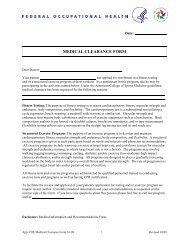A LifeCare® Guide to <strong>Helping</strong> <strong>Others</strong> <strong>Cope</strong> <strong>With</strong> <strong>Grief</strong> Marked change in health status—If a child is suddenly sick a lot, the illnessesmay be a response to emotional stress. The child may need help expressinghis or her grief directly, <strong>and</strong> may benefit from talking with a counselor orattending a children’s grief support group. Thoughts <strong>of</strong> suicide—If a child says anything about not wanting to live,wishing he or she was dead or wanting to join the deceased, always treat this asa serious statement <strong>of</strong> pain <strong>and</strong> a need for more attention <strong>and</strong> support. Even ifyou think the child is just trying to get attention, don’t ignore these statementsor minimize their seriousness. Self-destructive behavior, such as alcohol use,drug use or risky stunts, should be treated similarly. If he or she is ignored, thechild may take more severe action to get the attention <strong>and</strong> help he or sheneeds.Finally, remember to listen to the child <strong>and</strong> encourage him or her to express his orher feelings, whatever those feelings are. You may not always know what the child isfeeling, but if you can provide a secure, positive environment where he or she feelslistened to, protected <strong>and</strong> loved, then you are giving a grieving child the best possiblesupport.Page 14
Suggested Reading on <strong>Helping</strong> <strong>Others</strong> <strong>Cope</strong><strong>With</strong> <strong>Grief</strong>I Can’t Stop Crying: It’s So Hard When Someone You Love Dies, by John D. Martin <strong>and</strong>Frank Ferris, M.D. Toronto: Key Porter Books, 1992.This book was written for individuals who are recently bereaved <strong>of</strong> someone veryclose to them—typically a partner, although the messages have a very wide application.The key messages is that it’s normal to feel bad, <strong>and</strong> that healing will come ifyou find safe ways to experience your emotions. Down-to-earth examples show howgrief affects many areas <strong>of</strong> daily life, relationships with others <strong>and</strong> hopes for thefuture. Practical tips in plain language are organized for easy reading.I Don’t Know What to Say: How to Help <strong>and</strong> Support Someone Who Is Dying, by RobertBuckman, M.D. New York: Vintage Books, 1992.Dr. Buckman, himself diagnosed with a terminal illness, addresses the patient’s needfor information, as well as the needs <strong>of</strong> family <strong>and</strong> friends; the way to support adying parent or child; <strong>and</strong> the complications <strong>of</strong> caring for those afflicted with AIDSor cancer.Letters to My Husb<strong>and</strong>, by Fern Field Brooks. Franklin Lakes, N.J.: Career Press,1995.A book about widowhood, showing one woman’s first year <strong>of</strong> mourning followingthe sudden death <strong>of</strong> her husb<strong>and</strong> due to a heart attack. She relives the trauma <strong>of</strong> hisdeath as well as many warm memories <strong>of</strong> their life together. The final message isone <strong>of</strong> hope <strong>and</strong> comfort despite the pain <strong>of</strong> loss.On Death <strong>and</strong> Dying, by Elisabeth Kubler-Ross. New York: Simon & Schuster TradePaperbacks, 1997.This is the world-famous bestseller by the woman who popularized the field <strong>of</strong>thanatology (the study <strong>of</strong> the phenomena <strong>of</strong> death <strong>and</strong> <strong>of</strong> the psychological mechanismsfor coping with them) as a subject for general social commentary. This washer first book on the topic <strong>and</strong> is considered a classic, introducing the famous “fivestages” model.Safe Passage: Words to Help the Grieving Hold Fast <strong>and</strong> Let Go, by Molly Fumia.Berkeley, Calif.: Conari Press, 1992.Words <strong>of</strong> comfort for those who have suffered a loss move the reader throughthe raw emotions <strong>of</strong> grief—denial, anger, confusion, guilt, <strong>and</strong> loneliness—toacceptance <strong>and</strong> transformation.What to Do When a Loved One Dies: A Practical <strong>and</strong> Compassionate Guide to Dealing<strong>With</strong> Death on Life’s Terms, by Eva Shaw. Irvine, Calif.: Dickens Press, 1994.From organ donation <strong>and</strong> planning the funeral to living with suicide <strong>and</strong> practicalmatters <strong>of</strong> trusts <strong>and</strong> wills, this indispensable reference guides the reader through awide range <strong>of</strong> concerns about the death process.Page 15















